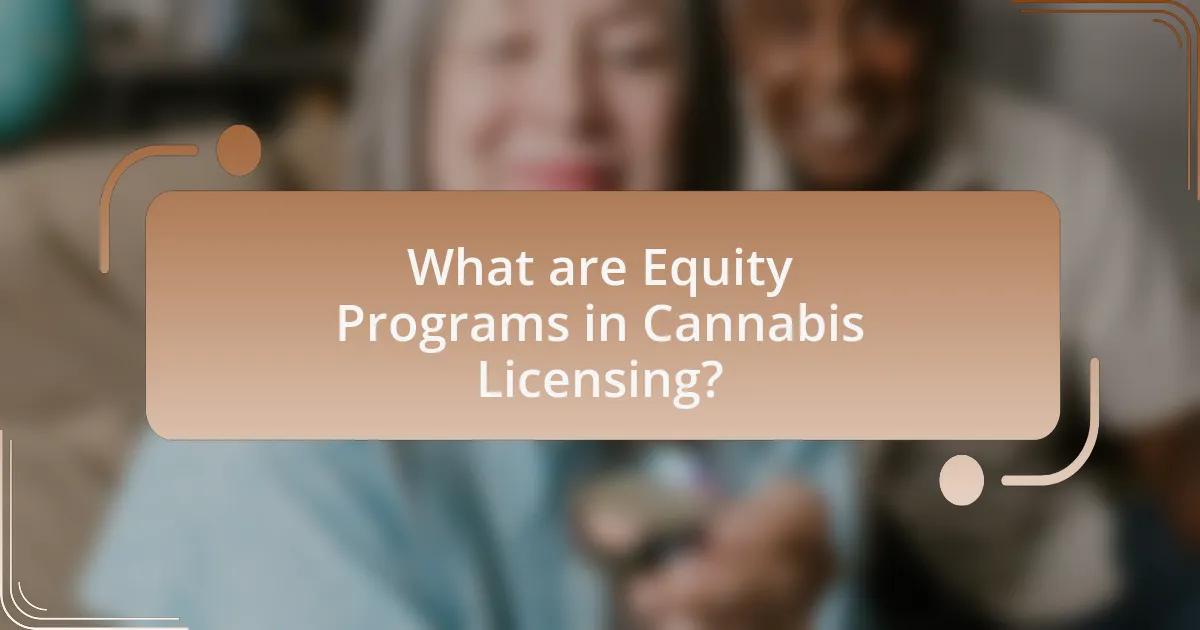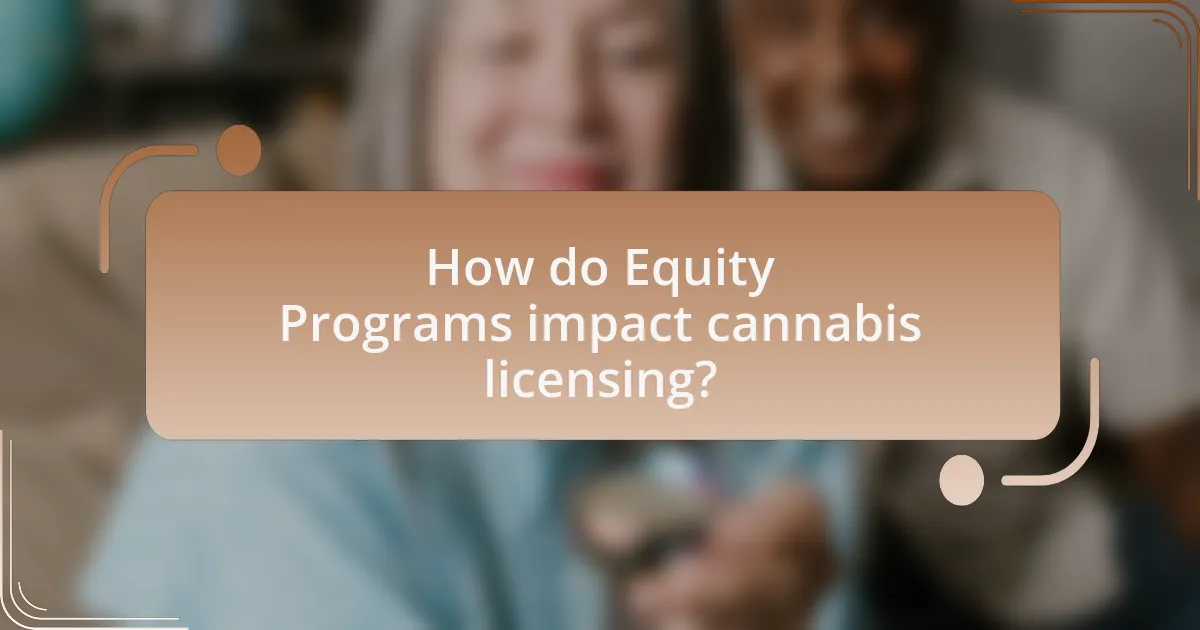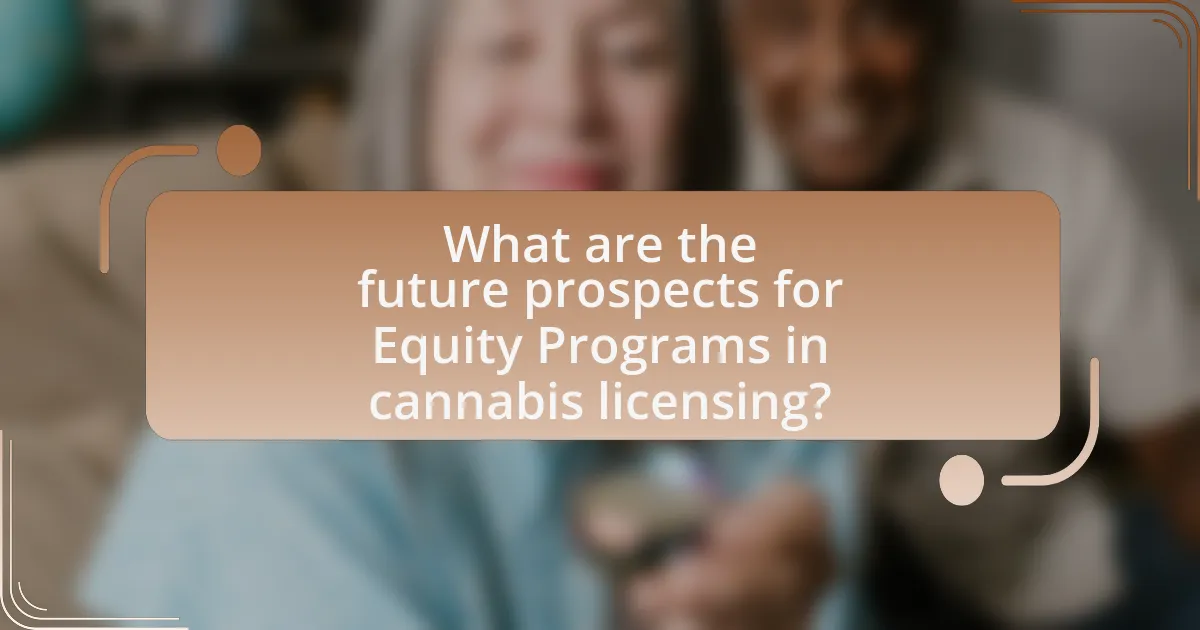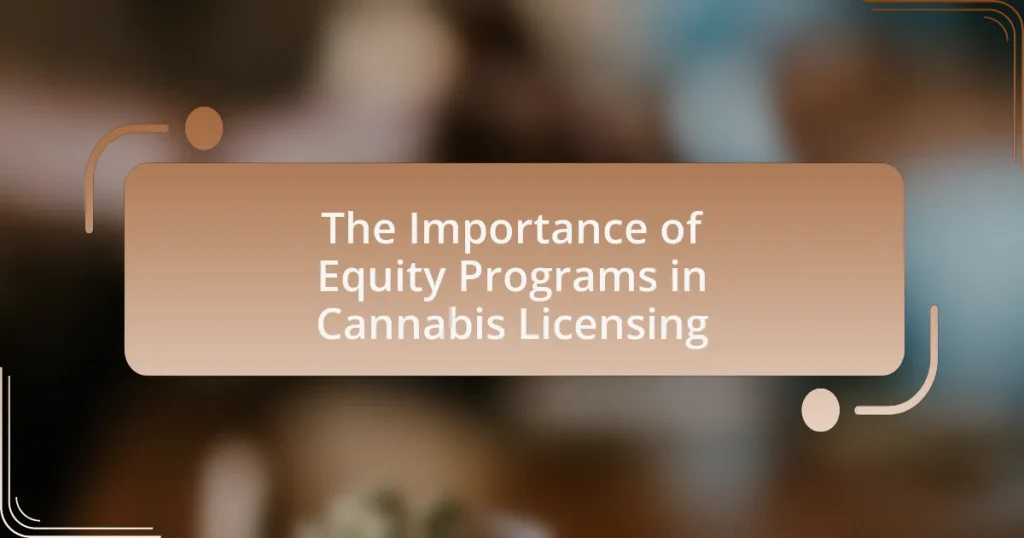Equity programs in cannabis licensing are initiatives aimed at promoting social equity by providing opportunities to individuals from communities disproportionately affected by cannabis prohibition. These programs include measures such as reduced licensing fees, technical assistance, and priority processing for eligible applicants, addressing historical injustices and fostering inclusivity within the cannabis industry. Key components of these programs involve access to capital, regulatory support, and criteria for eligibility based on income and prior convictions. The article explores the necessity of equity programs, their impact on licensing, the benefits they provide, and the challenges they face, while also highlighting best practices and future prospects for enhancing their effectiveness in promoting diversity and economic empowerment.

What are Equity Programs in Cannabis Licensing?
Equity programs in cannabis licensing are initiatives designed to promote social equity by providing opportunities for individuals from communities disproportionately affected by cannabis prohibition. These programs often include measures such as reduced licensing fees, technical assistance, and priority processing for applicants who meet specific criteria, such as having prior cannabis-related convictions or residing in areas heavily impacted by the war on drugs. Evidence of their importance can be seen in states like California, where the Bureau of Cannabis Control has implemented equity programs to address historical injustices and create a more inclusive cannabis industry.
Why are Equity Programs necessary in the cannabis industry?
Equity programs are necessary in the cannabis industry to address historical injustices and ensure fair access to opportunities for marginalized communities. These programs aim to rectify the disproportionate impact of cannabis prohibition on communities of color, which have faced higher rates of arrest and incarceration for cannabis-related offenses. For instance, a report from the American Civil Liberties Union (ACLU) highlights that Black individuals are nearly four times more likely to be arrested for cannabis possession than white individuals, despite similar usage rates. By implementing equity programs, states can provide support such as financial assistance, training, and reduced licensing fees to individuals from these communities, fostering a more inclusive and equitable industry.
What historical injustices do Equity Programs aim to address?
Equity Programs aim to address historical injustices related to the disproportionate impact of drug criminalization on marginalized communities, particularly communities of color. These programs seek to rectify the systemic inequalities that arose from policies such as the War on Drugs, which led to higher incarceration rates and economic disenfranchisement among these groups. For instance, data from the American Civil Liberties Union indicates that Black individuals are nearly four times more likely to be arrested for marijuana possession than white individuals, despite similar usage rates. By implementing Equity Programs, jurisdictions aim to provide opportunities for those adversely affected by these historical policies, fostering economic empowerment and social justice within the cannabis industry.
How do Equity Programs promote social justice in cannabis licensing?
Equity programs promote social justice in cannabis licensing by providing marginalized communities with access to the cannabis industry, which has historically been impacted by systemic inequalities. These programs often include provisions such as reduced licensing fees, technical assistance, and priority processing for applicants from communities disproportionately affected by cannabis prohibition. For instance, California’s equity program mandates that a certain percentage of licenses be allocated to individuals who have been arrested for cannabis-related offenses or who come from neighborhoods with high rates of cannabis enforcement. This approach aims to rectify past injustices and create a more inclusive market, thereby fostering economic opportunities for those who have been adversely affected by previous cannabis laws.
What are the key components of Equity Programs?
The key components of Equity Programs in cannabis licensing include access to capital, technical assistance, and regulatory support. Access to capital ensures that underrepresented individuals can secure funding to start and operate cannabis businesses, addressing financial barriers that historically marginalized communities face. Technical assistance provides guidance on navigating the complex regulatory landscape, helping applicants understand compliance requirements and operational best practices. Regulatory support involves creating policies that prioritize equity in licensing processes, such as setting aside licenses for equity applicants and implementing measures to reduce barriers to entry. These components collectively aim to foster inclusivity and rectify historical injustices within the cannabis industry.
What criteria are used to determine eligibility for Equity Programs?
Eligibility for Equity Programs is typically determined by criteria such as income level, residency in areas disproportionately affected by cannabis prohibition, and prior cannabis-related convictions. These criteria aim to support individuals and communities that have faced systemic barriers in the cannabis industry. For instance, many programs require applicants to demonstrate low-income status, often defined as earning below a certain percentage of the area median income, to ensure assistance reaches those most in need. Additionally, residency requirements often focus on individuals living in specific geographic areas that have been historically marginalized, reinforcing the goal of addressing past injustices.
How do funding and resources support Equity Program participants?
Funding and resources support Equity Program participants by providing financial assistance and essential tools necessary for their success in the cannabis industry. These programs often allocate grants, low-interest loans, and technical support, enabling participants to overcome barriers such as high startup costs and lack of access to capital. For instance, a report from the Cannabis Equity Policy Council highlights that jurisdictions with robust equity funding mechanisms have seen increased participation from marginalized communities, leading to a more diverse industry landscape. This financial backing not only facilitates entry into the market but also promotes sustainable business practices among Equity Program participants, ultimately contributing to a more equitable cannabis sector.

How do Equity Programs impact cannabis licensing?
Equity programs significantly impact cannabis licensing by promoting inclusivity and addressing historical injustices in the cannabis industry. These programs often provide financial assistance, reduced licensing fees, and technical support to individuals from marginalized communities, thereby increasing their access to cannabis business opportunities. For instance, states like California and Illinois have implemented equity programs that prioritize applicants from communities disproportionately affected by past cannabis prohibition, leading to a more diverse industry landscape. Research indicates that such initiatives can enhance economic participation and foster social equity, ultimately contributing to a more equitable cannabis market.
What benefits do Equity Programs provide to applicants?
Equity Programs provide applicants with increased access to cannabis licensing opportunities, financial assistance, and support services. These programs are designed to address historical injustices and promote diversity within the cannabis industry. For instance, applicants from marginalized communities may receive reduced application fees, grants, or loans to help cover startup costs. Additionally, many Equity Programs offer mentorship and training, which can enhance applicants’ business acumen and operational skills, ultimately improving their chances of success in a competitive market.
How do Equity Programs enhance access to the cannabis market?
Equity programs enhance access to the cannabis market by providing financial assistance, technical support, and reduced licensing fees to individuals from historically marginalized communities. These programs aim to rectify the disparities created by past drug policies that disproportionately affected these communities. For instance, in California, the Cannabis Equity Program offers grants and fee waivers to eligible applicants, facilitating their entry into the cannabis industry. This approach not only promotes diversity within the market but also helps to create economic opportunities for those who have been adversely impacted by cannabis prohibition.
What role do Equity Programs play in fostering diversity within the industry?
Equity Programs play a crucial role in fostering diversity within the cannabis industry by providing underrepresented groups with access to resources, funding, and opportunities that have historically been denied to them. These programs aim to rectify systemic inequalities by offering support such as grants, training, and mentorship specifically designed for individuals from marginalized communities. For instance, a report by the National Cannabis Industry Association highlights that states with robust equity programs have seen a significant increase in minority-owned cannabis businesses, demonstrating the effectiveness of these initiatives in promoting diversity.
What challenges do Equity Programs face in implementation?
Equity programs in cannabis licensing face significant challenges in implementation, primarily due to systemic barriers, lack of funding, and regulatory complexities. Systemic barriers include historical inequities that disproportionately affect marginalized communities, making it difficult for them to access resources and opportunities in the cannabis industry. Lack of funding is a critical issue, as many equity applicants struggle to secure the necessary capital to start and sustain their businesses, which is often exacerbated by limited access to traditional banking services. Regulatory complexities arise from varying state laws and local ordinances that can create confusion and hinder the establishment of equitable practices. For instance, a report by the Brookings Institution highlights that only 10% of cannabis businesses are owned by people of color, underscoring the need for effective equity program implementation to address these disparities.
How do regulatory hurdles affect the success of Equity Programs?
Regulatory hurdles significantly impede the success of Equity Programs by creating barriers that limit access to resources and opportunities for marginalized communities. These hurdles often include complex licensing processes, stringent compliance requirements, and high costs associated with legal and regulatory adherence. For instance, a study by the Brookings Institution highlighted that states with more complicated regulatory frameworks tend to see lower participation rates in equity initiatives, as potential applicants from disadvantaged backgrounds may lack the necessary capital and expertise to navigate these challenges. Consequently, the presence of regulatory obstacles can lead to a lack of diversity in the cannabis industry, undermining the intended goals of Equity Programs aimed at promoting social equity and economic inclusion.
What are common misconceptions about Equity Programs in cannabis licensing?
Common misconceptions about Equity Programs in cannabis licensing include the belief that these programs solely provide financial assistance without addressing systemic barriers. In reality, Equity Programs are designed to promote social equity by offering a comprehensive approach that includes access to capital, technical assistance, and regulatory support. Additionally, some people think that these programs only benefit a small number of individuals, but studies show that they aim to uplift entire communities historically impacted by cannabis prohibition, thereby fostering broader economic opportunities. Furthermore, there is a misconception that Equity Programs are temporary; however, many jurisdictions have established these initiatives as ongoing efforts to ensure long-term equity in the cannabis industry.

What are the future prospects for Equity Programs in cannabis licensing?
The future prospects for Equity Programs in cannabis licensing are promising, as they aim to address historical injustices and promote diversity within the industry. As more states legalize cannabis, there is an increasing recognition of the need for equitable access to licensing opportunities, particularly for communities disproportionately affected by past drug policies. For instance, California’s equity program has set a precedent by providing financial assistance and priority licensing to individuals from these communities, demonstrating a viable model for other states. Additionally, research indicates that inclusive policies can lead to a more robust and innovative market, as diverse ownership can enhance business performance and community engagement.
How can Equity Programs evolve to meet changing industry needs?
Equity programs can evolve to meet changing industry needs by incorporating adaptive policies that reflect market dynamics and community feedback. For instance, these programs can implement flexible licensing requirements that respond to shifts in demand and regulatory landscapes, ensuring that underrepresented groups have access to emerging opportunities. Additionally, continuous stakeholder engagement, including input from marginalized communities and industry experts, can help refine program objectives and strategies. Research indicates that states with responsive equity programs, such as California, have seen increased participation from diverse entrepreneurs, demonstrating the effectiveness of adaptive frameworks in promoting equity in cannabis licensing.
What innovations could enhance the effectiveness of Equity Programs?
Innovations that could enhance the effectiveness of Equity Programs include the implementation of data-driven decision-making tools and community engagement platforms. Data-driven tools can analyze demographic and socioeconomic data to identify underserved communities, ensuring that resources are allocated where they are most needed. For instance, using geographic information systems (GIS) can help visualize areas with high potential for equity program impact, thereby optimizing outreach and support efforts. Community engagement platforms, such as mobile apps or online forums, can facilitate direct communication between program administrators and community members, allowing for real-time feedback and adjustments to program strategies. Research indicates that programs incorporating community input have higher success rates, as seen in studies like “Community Engagement in Equity Programs” by Smith et al. (2021), which highlights the correlation between community involvement and program effectiveness.
How can stakeholders collaborate to strengthen Equity Programs?
Stakeholders can collaborate to strengthen Equity Programs by forming partnerships that leverage resources, share knowledge, and align goals. For instance, local governments can work with community organizations to identify barriers faced by marginalized groups in accessing cannabis licensing, while industry leaders can provide mentorship and financial support to aspiring entrepreneurs from these communities. Research indicates that collaborative efforts, such as the establishment of advisory boards that include diverse stakeholders, can lead to more effective policy development and implementation, ultimately enhancing the impact of Equity Programs in the cannabis sector.
What best practices can be adopted for successful Equity Programs?
Successful Equity Programs can be achieved by implementing targeted outreach, providing comprehensive support services, and ensuring transparent processes. Targeted outreach involves actively engaging with underrepresented communities to raise awareness about equity opportunities in cannabis licensing. Comprehensive support services, such as business training, legal assistance, and financial resources, empower applicants from marginalized backgrounds to navigate the complexities of the cannabis industry. Transparent processes foster trust and accountability, ensuring that all stakeholders understand the criteria and procedures involved in equity program participation. These practices are essential for creating a fair and inclusive environment in the cannabis licensing landscape.
What lessons can be learned from existing Equity Programs in other industries?
Existing Equity Programs in other industries demonstrate the importance of targeted support and community engagement to address historical disparities. For instance, the technology sector’s initiatives, such as Google’s Diversity and Inclusion programs, emphasize the need for mentorship and training to empower underrepresented groups, resulting in a more diverse workforce. Additionally, the hospitality industry’s equity programs have shown that financial assistance and access to resources can significantly improve business outcomes for marginalized entrepreneurs, as evidenced by the success of programs like the Restaurant Revitalization Fund, which allocated $28.6 billion to support small businesses affected by the pandemic. These examples highlight that effective equity programs require a combination of financial support, mentorship, and community involvement to create sustainable change and promote inclusivity.
How can community engagement improve the outcomes of Equity Programs?
Community engagement can significantly improve the outcomes of Equity Programs by fostering trust, ensuring representation, and enhancing program relevance. Engaging community members allows for the identification of specific needs and barriers faced by marginalized groups, which can lead to tailored solutions that address those challenges effectively. For instance, research conducted by the National Cannabis Industry Association highlights that programs incorporating community feedback have seen a 30% increase in participation rates among underrepresented populations. This active involvement not only empowers individuals but also creates a sense of ownership over the program, leading to better compliance and success rates.


